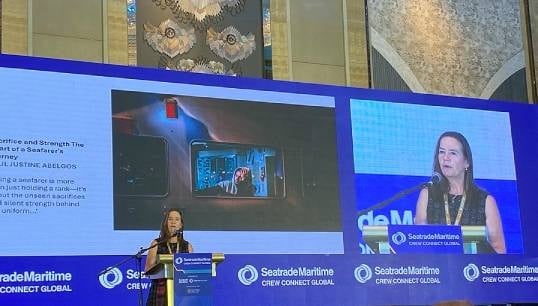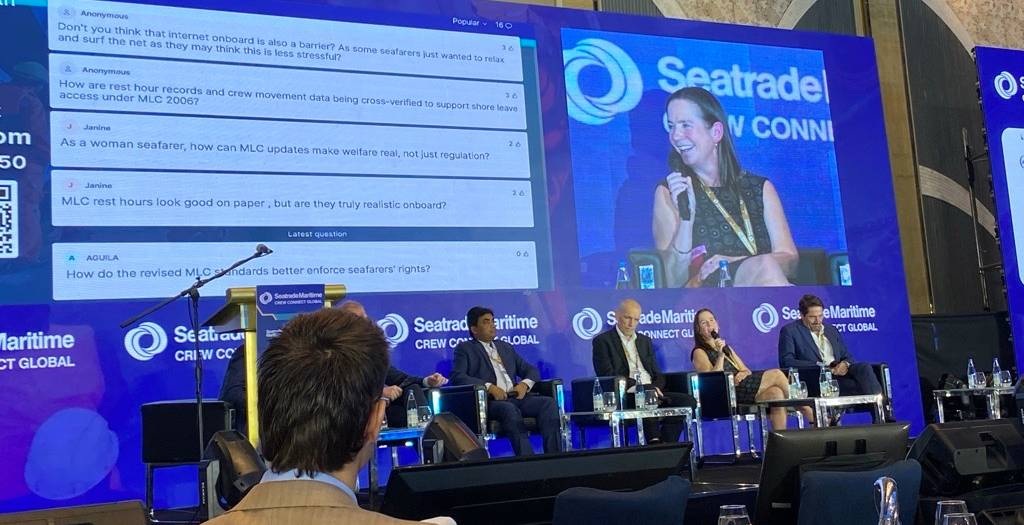- Topics
- Campaigning
- Careers
- Colleges
- Community
- Education and training
- Environment
- Equality
- Federation
- General secretary message
- Government
- Health and safety
- History
- Industrial
- International
- Law
- Members at work
- Nautilus news
- Nautilus partnerships
- Netherlands
- Open days
- Opinion
- Organising
- Podcasts from Nautilus
- Sponsored content
- Switzerland
- Technology
- Ukraine
- United Kingdom
- Welfare
Seafarer shore leave still alarmingly out of reach despite positive 'mood music' from shipping
25 November 2025

In ports around the world the right to step ashore is still out of reach for many seafarers, according to a newly released report from grant-funding body the ITF Seafarers' Trust. It paints a troubling picture of persistent barriers to shore leave – years after Covid-19 restrictions eased. Deborah McPherson interviews the head of the ITF Seafarers' Trust, Katie Higginbottom, on the latest findings
Key barriers
The latest report, Shore leave and the future of port-based welfare, is a companion report to a previous study of seafarers, this time with evidence gathered from seafarer centres which confirms shore leave is in an alarming state of decline.
The Trust's previous study, Shore leave: rare, brief and in danger of extinction, was a questionnaire of seafarers analysed by the World Maritime University (WMU) and published earlier in 2025. It revealed a significant number of seafarers continue to face restrictions on shore leave, despite the easing of Covid-19-related travel barriers.
Ms Higginbottom said the findings from both reports were remarkably consistent with each other. 'The top two barriers are lack of time in port and too much work onboard, along with access to leave from the port side in some cases'.
Seafarers report that, even when technically allowed, the time and effort needed to arrange shore leave can be overwhelming – especially when weighed against the need for sleep, as highlighted by the previous research. Rest comes first, especially amid tight turnarounds.
'The most significant finding from the seafarer welfare centres is that it corroborates the fact that seafarer shore leave is in decline,' said Ms Higginbottom. 'Over 60% of the centres said seafarer crew visitor numbers had not recovered since the pandemic, which is quite alarming since that was a few years ago now, so that is the wrong trajectory.'
While the Maritime Labour Convention enshrines the right to shore leave, Ms Higginbottom noted that the latest report shows regulations are qualified by operational needs with 'multiple people involved in this picture' [of declining leave].
'Masters are under immense business pressure themselves, yes, they have to comply with the regulation, but the MLC gives and it takes, with various operational factors. Shipping companies need to empower masters to make positive choices, rather than just deny shore leave altogether.
'There are so many people involved in the compliance chain who should check, but there is no one person clearly responsible for making it happen, when the fact is it is everybody. Everybody needs to be aligned to making it a possibility.'
There was also a disconnect between what shipowners say about the welfare of seafarers publicly and what they agree to in negotiations, added Ms Higginbottom.
Fresh from presenting the findings at a crewing conference in Manila, she noted that while the 'mood music' from the shipping industry was positive towards improving seafarer welfare, practically it is in decline.
'They either express their frustration that the regulation is not fit for purpose, or there is not a level playing field, or it is "somebody else that does it not us", whereas the findings are quite clear. It is across the board, it is the majority, and it is an alarming trend due to external pressures.'
Ms Higginbottom said these pressures were reinforced through other recent research which suggested charterers are not prepared to pay a premium for positive welfare for seafarers. Quality shipowners were therefore unhappy that they were required to compete with less scrupulous companies.
'I understand those arguments, but it feels to me like it's an issue that is kind of lower down the pecking order, and yet quite fundamental,' said Ms Higginbottom. 'The first study showed that a quarter of seafarers didn't get off the ship at all in the entirety of their of their voyage, and that was based on a voyage of 6.6 months average. So that's, a long, long time to be on a vessel and not touching dry land.'
'The mood music from the shipping industry is positive towards improving seafarer welfare, but practically it is in decline Katie Higginbottom, head of the ITF Seafarers' Trust
The high price of denial
The repercussions are equally profound. Quick turnarounds not only deprive seafarers of shore time but rob them of sleep which adds to dangerous fatigue. Ms Higginbottom pointed to the Trust's previous research on shore leave where seafarers admitted to 'fudging' records to appear compliant with work-rest rules.
'The ability to step ashore – even briefly – isn't just tradition; it's vital for morale. Feeling welcome, setting foot on dry land, visiting a seafarer centre, or shopping in town – they all make a difference.'
Industry responses and social attitudes
Reaction to the report has been mixed. While many in the industry acknowledge the strain, a vocal minority on social media suggest today's seafarers must simply 'suck it up'. Ms Higginbottom counters that this attitude ignores the dramatic technological and regulatory changes that have upended the work-life balance at sea, compared to decades ago when shore leave could be a matter of weeks.
'Quality of work is something we still need to fight for. You don't maintain or improve these things just by chance, you need advocacy,' she warns.

On a positive note, Ms Higginbottom added that the MLC amendment around shore leave was approved in April and will come into force in a couple of years, albeit still with some caveats; and there has been recognition and agreement to establish an ILO/IMO working group on hours of work and rest. But she warned that 'there is a looming shortage of seafarers, so the industry needs to think about where the line is in terms of attractiveness and retention, and if you keep going in this direction or reducing quality of life you are not going to attract new seafarers.'
The road ahead: union action and collective solutions
Ms Higginbottom said the report's recommendations are clear: collective action is needed across a range of stakeholders.
'The Trust, as a funder of welfare centres and transport [at ports], will look at where to put its resources, as well as ways to promote shore leave and work with port states and companies to address some of the barriers.
'The shipping companies, if genuinely in favour of shore leave, need policies that embed that culture of health and safety and wellbeing for seafarers down the ranks.'
Unions, such as Nautilus, also have a crucial role at the international and national levels in arenas which bring stakeholders together, she said, such as advocating for regulatory improvements via the International Maritime Organization and the International Labour Organization through the ITF; as well as supporting crew by being represented on local port welfare committees [which Nautilus currently does through the Nautilus Welfare Fund].
The message is clear, said Ms Higginbottom: 'Shore leave isn't a luxury. It's a basic right, crucial for health, safety, and morale. The fight to restore accessible shore leave must be waged collectively – at conferences, in union meetings, and through every ship that docks.'
Tags
More articles
Setting standards for seafarers
Premium protection for members
Fighting FOCs at home and abroad
'Unaddressed crisis': one in four seafarers still denied shore leave, new study finds
A recent study conducted by the ITF Seafarer' Trust (ITFST) and analysed by the World Maritime University (WMU) reveals that a significant number of seafarers continue to face restrictions on shore leave, despite the easing of Covid-19-related travel barriers since 2022.
